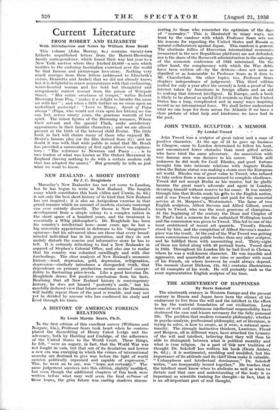Macaulay's New Zealander has not yet come to London, but
lie has begun to write in New Zealand. The longish essay which constitutes .this book (Allen and Unwin, 3s. 6d.) • is not only the best short 'history of its kind that New Zealand has yet inspired ; it is also an Antipodean exercise in that grand manner which no amount of modern staccato contempt can ever entirely discredit. The theme is New Zealand's development from a simple colony to a complex nation in the short space of a hundred years, and the treatment is essentially a Whig philosopher's. Dr. Beaglehole has been his country's intellectual hero—some years- ago he lost a big university appointment in deference to his "dangerous " opinions—but his advanced ideas are those that every broad- minded individual has in his generation, and they do not unduly disturb the concise and informative story he has to tell. It is certainly refreshing to find a New Zealander in support of Stephen's Colonial Office, and also one to realise that his country was colonised unwillingly and with dire forebodings. The clear analysis of New Zealand's economic
history—wool, depression, gold, depression, refrigeration, depression—similarly introduces a disregarded,_ truth, -that
dependence on primary production means unusual suscept- ibility to fluctuating price-levels. Like a good historian Dr. Beaglehole draws few positive conclusions from his facts.
Realising that all New Zealand history is contemporary history, he does not hazard " posterity's smile," but his carefully deduced view that future conditions in the Dominion will hardly repeat those of the past is tenable, and may not yet be derided by anyone who has confirmed his study and lived through his times.






































 Previous page
Previous page